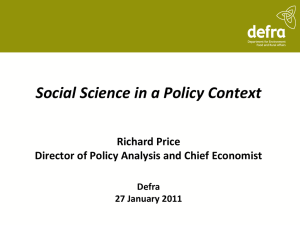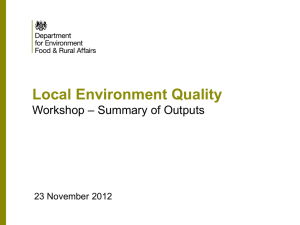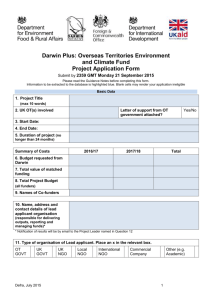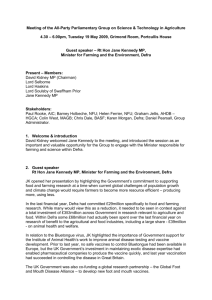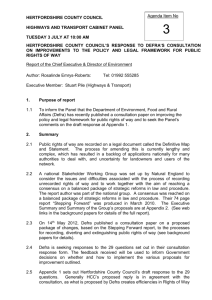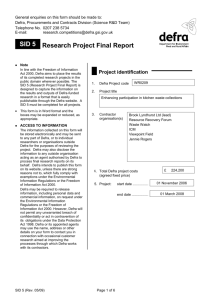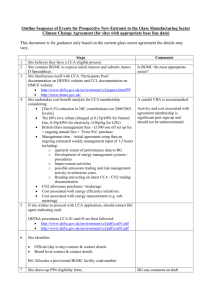DrEmmaHennessey-presentation
advertisement
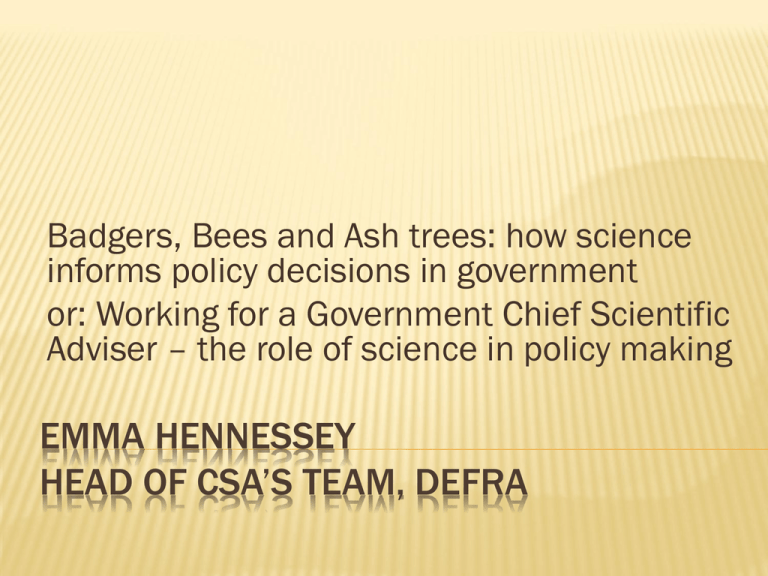
Badgers, Bees and Ash trees: how science informs policy decisions in government or: Working for a Government Chief Scientific Adviser – the role of science in policy making EMMA HENNESSEY HEAD OF CSA’S TEAM, DEFRA DEFRA IS A EVIDENCE-BASED ORGANISATION Evidence = science, economics, social and operational research, veterinary sciences, engineering, statistics, geography etc. Policies are informed by evidence Defra Network spends over £230m p.a. on evidence (core Defra spends around £160m p.a.) DEFRA HAS OVER 300 SPECIALISTS Profession Science Economics 1 Statistics Social Research Vets Operational Research Engineering 2 Other Total 1 2 Number 106 85 80 17 12 10 7 4 321 Includes administrative staff providing analytical support to the statisticians; Includes Analysts and Research Fellow es. The numbers shown are as at 3 Feb 2014 and include people who are currently out of the department on loan, secondment, career break, special leave, and people currently on loan / secondment to Defra. WIDER NETWORK Defra has three lab agencies: Fera (Food and Environment Research Agency), AHVLA (Animal Health Veterinary Laboratory Agency), Cefas (Centre for Environment, Fisheries and Aquaculture Science) Also scientists at Kew, EA, NE, MMO, JNCC, FR/FC Over 3000 specialists CHIEF SCIENTIFIC ADVISER – CHALLENGES AND SUPPORTS DEFRA’S SPECIALISTS provides Ministerial advice on evidence base to support policy decisions ensures quality and fit-for-purpose science raises the profile of Defra science and manage interface with the public is a member of the Defra Supervisory Board supported by Heads of Profession SCIENCE ADVISORY COUNCIL PROVIDES EXPERT INDEPENDENT ADVICE ON SCIENCE POLICY AND STRATEGY Responsible for: providing expert independent advice and challenge to the Chief Scientific Adviser and ministers helping to guide Defra’s scientific priorities and planning, including long-range planning as well as dealing with immediate risks and opportunities DEFRA’S PRIORITIES Defra’s four priorities are: Growing the rural economy Improving the environment Safeguarding animal health Safeguarding plant health Running through all of these is the priority of economic growth as the Government's top priority. DEFRA’S PRIORITIES TRANSLATE INTO 31 EVIDENCE PROGRAMMES Animal Welfare Aquatic Animal Health Bovine TB Disease Mitigation and Control Endemic diseases Exotic Diseases Transmissible Spongiform Encephalopathies Veterinary Medicine and Anti-Microbial Resistance Climate Change Mitigation for Agriculture and the Food Chain Crops EU Agriculture and Budget Strategy Farming Elements inc. GM Policy Livestock Plant Health, Bee Health, Plant Varieties and Seeds Sustainable, Secure and Healthy Food Supply Adapting to Climate Change Air Quality Better Regulation Biodiversity Chemicals & Nanotechnologies Floods Inland Waterways, Landscape and Outdoor Recreation Marine Natural Value Noise Pesticides Rural Communities Rural Development Programme for England Soil Protection Waste and Resources Water Availability and Quality and Drinking Water Inspectorate Sustainable Consumption and Production Sustainable Development Strategic Evidence EVIDENCE NEEDS ARE ARTICULATED IN EVIDENCE PLANS Budget Policy context Evidence needs Key partners https://www.gov.uk/government/publications/de fra-s-evidence-investment-strategy-2010-to-2013and-beyond-2011-update MOST SPECIALISTS ARE PART OF POLICY TEAMS Landscape, Rural, Crops Farming, Land and Soils Floods, Water Availability and Quality Food policy, Chemicals and Emerging Technologies, GM Air Quality, Noise, Waste Marine EU and Better Regulation Animal Health, Plant Health Animal Welfare, TB EVIDENCE TEAMS IN DEFRA ARE MULTIDISCIPINARY Science Engineering Social Research Economics Statistics Operational Research Etc…. CORPORATE CENTRE EVIDENCE TEAM RESPONSIBLE FOR EVIDENCE POLICY Supporting the CSA, SAC and Director of Analysis Preparing evidence strategy Setting quality standards, embedding procurement rules Strategic partnership (EU funding) Geography and Earth Observations Responding to PQs and FoI requests Overseeing evidence budgets Looking after Defra’s specialists HOW WE ALL WORK TOGETHER Policy DG CSA SAC Corporate evidence team Policy teams manage evidence to meet their policy needs CSA, SAC and Corporate Evidence Team supports evidence processes, ensures QA EXAMPLES OF EVIDENCE ACTIVITIES Royal Commission on Environmental Pollution Volcanic Ash Winter chill Chalara inc. tree health Bees Badgers MAKING A DIFFERENCE…IDEAS INTO ACTION Winter chill project Working with the industry to identify a potential problem Scoping out a project and ensuring MAFF got a useful report Speaking to the media Seeing action taken as a result The work was immediate, relevant, useful TREE HEALTH - CHALARA My team supported the initial response Provided secretariat for Tree Health and Plant Biosecurity Expert Taskforce https://www.gov.uk/government/uploads/system/uploads/attachment_ data/file/200393/pb13878-tree-health-taskforce-final-report.pdf Worked with BBSRC to get LWEC programme up and running http://www.bbsrc.ac.uk/funding/opportunities/2013/tree-health-andplant-biosecurity-phase2.aspx It was: very fast-moving, needed to get up to speed very fast (finding experts, arranging meetings, managing stressed people! drafting etc) Setting up an evidence programme was part of the Government response to the problem BEES AND NEONICITINOIDS Neonicitinoids: The European Commission pushed through a two-year ban on neonics in response to the European Food Safety Authority’s (EFSA) scientific opinion that these insecticides posed an unacceptable risk to bees. But insecticides used on crops Shown to have harmful effects on bees in lab studies UK government said the scientific case for banning neonics, based largely on lab studies in which bees were exposed to much higher doses of pesticides than when they are in the field. Fera study established that when used under field conditions within a normal agricultural setting neonics did not have a major effect on bumblebee colonies. The subject is very emotive. What’s the right answer? BADGERS AND TB TB a serious and growing problem in dairy herds Randomised Badger Culling Trial (RBCT) Expert opinion divided http://www.defra.gov.uk/animal-diseases/a-z/bovinetb/badgers/culling/

